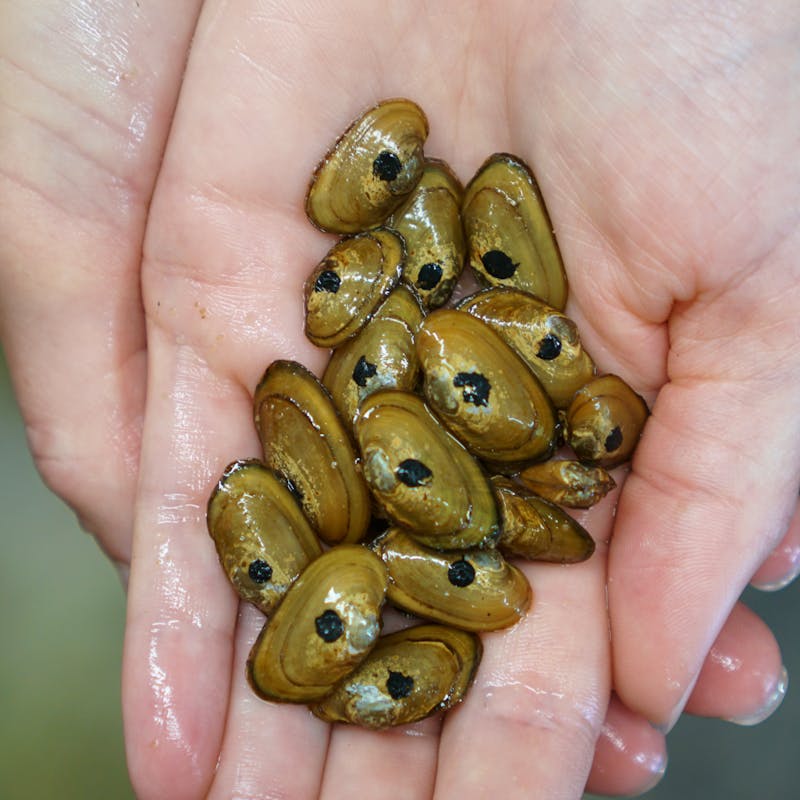Enter the world of the often forgotten: the tiny, teaming microhabitats that exist out-of-sight and out-of-mind for many. The weird, wonderful and wild flourish in these often overlooked and fragile places where being unusual belies a far greater role. Biodiversity is not just about the charismatic species that have captured your hearts – the ones that have small children howling and growling before they learn to walk. Biodiversity is about the foundation of all life and its interconnectedness. This means that no matter how big or small, how cute or weird, everything contributes to the diversity that our economies, national security and health and well-being and so much more depend on. Even in these small, unsuspecting habitats, we can find bountiful life and important duties.
This is the world belonging to the more than 2,400 species of native freshwater and terrestrial snails found in the United States, each an instrumental asset for such services as nutrient recycling, soil creation and even pollination. It's also the world of the approximately 300 species of freshwater mussels in our country that are incredibly important for water filtration.
Unfortunately, despite their richness and importance, these less charismatic critters have also suffered the consequences of the biodiversity crisis, being particularly prone to habitat loss, pollution and climate change.
Freshwater mussels in particular are considered one of the most imperiled groups of species in our country with the vast majority either extinct, endangered, threatened or of special concern.
Consider the endangered, diatomaceous ooze-dwelling (yes, ooze is a scientific term! It means sediment made up of the shells of microscopic algae) Royal marstonia snail, or Royal springsnail, found nowhere else on Earth but Marion County, Tennessee where it is has been the victim of coal mining and other habitat destruction. It resides in only two spring-fed streams, lives but a year and is no bigger than a pencil-top eraser. But like all species, the Royal marstonia snail plays a role in its ecosystem, and thanks to the Endangered Species Act and the protections it receives under it, this cool critter continues to play its part.
That ecosystem, in turn supports the species that are maybe more commonly noted - bird species like warblers, herons and swallows and mammal species like foxes and bobcats. It also supports a whole web of life, including us humans who rely on those streams for drinking water.
There’s also the endangered Altamaha spinymussel, found only in Georgia—a state that hosts more than 10 percent of all species of freshwater mussels globally—one of only three species in North America to have spikes. Like many in their imperiled family, very little about this species is known, but their role in filtering our waterways and providing oxygenated nutrient-rich streambed habitat for insects and other aquatic species through their burrowing and nutrient cycling and serving as a food source for other creatures can’t be understated.
Thanks to the ESA, an incredibly forward-looking law, the benefits of these ecosystems remain, however tenuously, because protections have been granted based on species’ needs and decisions based on the best available science. However, despite the law being overwhelmingly supported by the majority of Americans, regardless of political leaning, anti-wildlife politicians have been increasing their efforts this year to delist species or otherwise hinder implementation of the law in the face of escalating threats like climate change for ill-informed, short-sighted political purposes.
As we mark the 50th anniversary of this landmark law, the need for a strong ESA safeguarding our nation’s biodiversity - fur, skin, scales, shells, mucous, and all—has never been greater. All imperiled species deserve sound scientific decision-making and protections that prevent them from disappearing forever and the support to recover and thrive in balanced ecosystems that then in turn support us.







